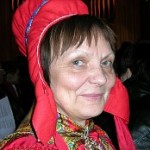Poetry in Translation (CCVI): Inga Ravna EIRA (b. 1948), SAMILAND / LAPLAND /LAPONIA/ NORWAY, “The Gods ”, “Zeii”, “Gudene”, “Ipmilat“
The Gods
Inga Ravna EIRA (b. 1948)
The Gods turned the soil
hid the gold under the stones
but the strangers found it
The spirits and the underworld people fled
hid in the mountain
but were nevertheless disturbed
How dare they
challenge gods and spirits
(English translation by Kari Wattne)
* * * * * * * *
Zeii
Inga Ravna EIRA (n. 1948)
Zeii au arat pământul
şi au ascuns aurul sub pietre
dar străinii l-au aflat.
Spiritele și oamenii vieţii de apoi au fugit
să se ascundă în munţi
dar au fost, totuși, găsiţi.
Oare, cum îndrăznesc, ei,
să supere zeii și spiritele?
(Rendered in Romanian by Constantin ROMAN, London,
© 2013 Copyright Constantin ROMAN)
* * * * * * *
Gudene
Inga Ravna EIRA (b. 1948)
Gudene vendte om jorda
gjemte gullet under steinene
men de fremmede fant det
Åndene og huldrene flyktet
gjemte seg i fjellene
men likevel blei de plaget
Hvordan tør de
utfordre guder og ånder
(Norwegian translation by Inga Ravna Eira and Kari Wattne)
****
Ipmilat
Inga Ravna EIRA (b. 1948)
Ipmilat jorgaledje eatnama
cihke golli gedggiid vuollái
muhto gal apmasat gávdne dan
Hálddit ja gufihttarat báhtaredje
ciekádedje váriid sisa
muhto gal dat lihkká vourjjahalle
Mo dustet
hástalit ipmiliid ja vuoinnaid.
(Sami original poem by Inga Ravna Eira, b. 1948)
SHORT NOTE:
Sami is the language of the people who inhabit the region they call Sapmi. This includes large parts of northern Scandinavia, from Norway to north western Russia, though the majority of the fifty thousand or so who define themselves as Sami (formerly known as Lapps or Finns) live in Norway. Traditionally their life is one of seasonal migration in close-knit groups as hunters and reindeer herders. The Sami language, which has several markedly different dialects, belongs to the Finno-Ugric branch of the Uralic family of languages. Assimilation policies, however, meant that for many years the use of the indigenous language was widely prohibited, and teachers were given bonuses for the number of children they made to stop speaking Sami. Nonetheless there remains an ancient tradition of oral literature in Sami, adapted to written form since the mid-nineteenth century. Yoik poetry—yoik being the Sami form of musical expression—has served for centuries to confirm social identity and literary and musical forms have long been used to articulate resistance against colonisation. Since the 1970s Sami literature has undergone a revival, though its position is far from secure. There are still many Sami who have never been educated in their own language.
Source: http://arts.brunel.ac.uk/gate/entertext/1_3_pdfs/eira.pdf






No Comments so far ↓
Like gas stations in rural Texas after 10 pm, comments are closed.